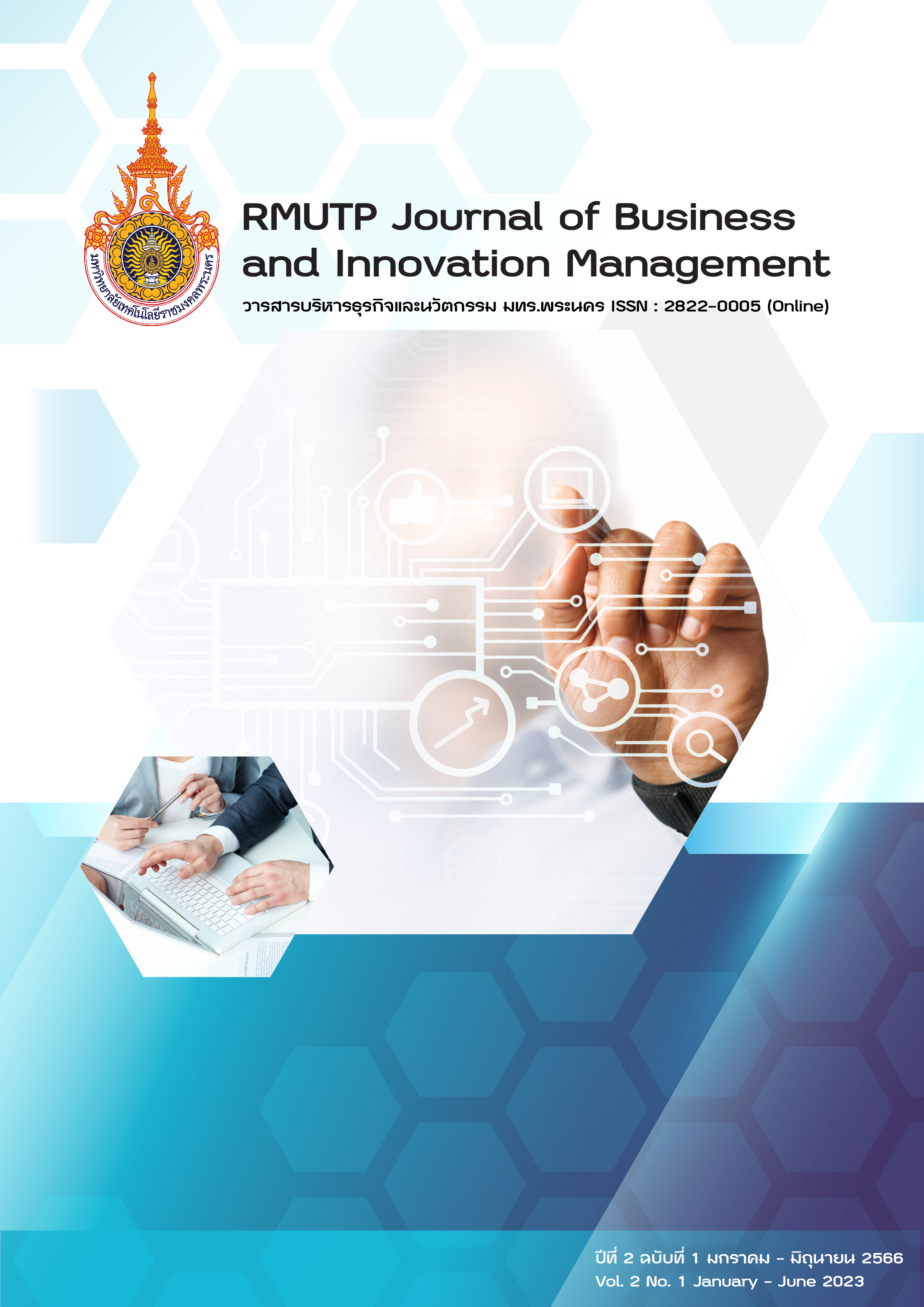Factors affecting consent to disclose personal information of commercial banking application users in Bangkok Metropolitan region
Main Article Content
Abstract
The purpose of this research was to identify the factors affecting consent to disclose personal information of users of commercial banking applications in Bangkok Metropolitan Region. The conceptual framework of Privacy Calculus Theory was applied to determine the conceptual framework of this research. This is a quantitative research using a questionnaires as a tool for data collection, a convenience selection method was used from 435 commercial banking application users, and multiple linear regression was used as a tool for data analysis.
This research result revealed that the factors affecting consent to disclose personal information of commercial banking application users in Bangkok metropolitan region, consisting of 1) value of disclosure resulting from benefit, positive emotion, negative emotion. 2) trust in organization, and 3) trust in system resulting from trust in organization. The sample group of commercial banking application users focus to the factor of trust in organization the most importance. Because there is trust in the commercial bank that develops the application will take care the financial transactions are according to the contract, can be tracked, and consider the maximum benefit of the service users resulting in consent to the disclosure of personal information.
Article Details

This work is licensed under a Creative Commons Attribution-NonCommercial-NoDerivatives 4.0 International License.
Articles published in the Journal of Business Administration and Innovation Rajamangala University of Technology Phra Nakhon contains information and content. The article's single author is accountable for it. In all instances, the journal's editors are not accountable for any losses incurred.
References
กระทรวงดิจิทัลเพื่อเศรษฐกิจและสังคม. (2562). พระราชบัญญัติคุ้มครองข้อมูลส่วนบุคคล พ.ศ. 2562. (2562, 27 พฤษภาคม). ราชกิจจานุเบกษา. (เล่ม 136 ตอนที่ 69ก, น. 52-95).
จิดาภา ทัดหอม. (2558). การตลาดผ่านสื่อสังคมออนไลน์ ความไว้วางใจและคุณภาพของระบบสารสนเทศที่มีผลต่อการตัดสินใจซื้อสินค้าผ่านช่องทางการถ่ายทอดสดเฟซบุ๊กไลฟ์ (Facebook Live) ของผู้บริโภคออนไลน์ในกรุงเทพมหานคร. การค้นคว้าอิสระ บริหารธุรกิจมหาบัณฑิต, มหาวิทยาลัยกรุงเทพ.
ธานินทร์ ศิลป์จารุ. (2557). การวิจัยและวิเคราะห์ข้อมูลทางสถิติด้วย SPSS และ AMOS. (พิมพ์ครั้งที่ 15). กรุงเทพฯ: ห้างหุ้นส่วนสามัญบิสซิเนสอาร์แอนด์ดี.
นิกร โภคอุดม. (2563). ความเป็นส่วนตัวของข้อมูลในยุคดิจิทัล. วารสารวิชาการมหาวิทยาลัยอีสเทิร์นเอเชีย ฉบับวิทยาศาสตร์และเทคโนโลยี. 14(2), 59-69.
นิยดา โฉมงาม. (2562). ความสัมพันธ์ระหว่างความไว้วางใจในคณะกรรมการและพฤติกรรมการค้างชำระค่าสาธารณูปโภคของผู้อยู่อาศัยในหมู่บ้านจัดสรรหมู่บ้านร่มโพธิ์. สารนิพนธ์ศิลปะศาสตร์มหาบัณฑิต, มหาวิทยาลัยเกริก.
ปฐมาภรณ์ จันทร์วิภาวี. (2564). ปัจจัยที่มีความสัมพันธ์กับพฤติกรรมในการใช้บริการธุรกรรมการเงินโมบาย แบงก์กิ้ง (Mobile Banking). สารนิพนธ์บริหารธุรกิจมหาบัณฑิต, มหาวิทยาลัยสงขลานครินทร์ วิทยาเขตภูเก็ต.
ปภานัน วงศ์กิตติชัยกุล. (2562). ปัจจัยที่ส่งผลต่อการใช้งาน Krungthai NEXT ของกลุ่มวัยสีเงินในเขต กรุงเทพมหานคร. วิทยานิพนธ์บริหารธุรกิจบัณฑิต, มหาวิทยาลัยศิลปากร.
ปวิตรา สอนดี. (2560). การยอมรับนวัตกรรม โมบายแบงก์กิ้งแอปพลิเคชันของกลุ่มผู้ใช้งานที่มีอายุ 40-60 ปี. การค้นคว้าอิสระนิเทศศาสตรมหาบัณฑิต, มหาวิทยาลัยกรุงเทพ.
วรพจน์ วงศ์กิจรุ่งเรือง. (2561). คู่มือพลเมืองดิจิทัล.กรุงเทพฯ: สำนักงานส่งเสริมเศรษฐกิจดิจิทัล กระทรวง ดิจิทัลเพื่อเศรษฐกิจและสังคม.
วัฒนา สุนทรธัย และวนิดา คูชัยสิทธิ์. (2558). ความเชื่อมั่นของแบบวัดที่มีเป้าหมายของการวัดแตกต่างกัน กรณีศึกษา: แบบประเมินผลการเรียนการสอน มหาวิทยาลัยกรุงเทพ. BU ACADEMIC REVIEW. 14(1), 13-25.
องอาจ นัยพัฒน์. (2547). วิธีวิทยาการวิจัยเชิงปริมาณและคุณภาพทางพฤติรรมศาสตร์และสังคมศาสตร์. กรุงเทพฯ: มหาวิทยาลัยศรีนครินทรวิโรฒ.
เอกพันธ์ พัฒนาวิจิตร. (2558). ปัจจัยที่ส่งผลต่อการเปิดเผยข้อมูลส่วนบุคคล กรณีศึกษาการลงชื่อเข้าใช้ด้วยรหัสผู้ใช้เฟซบุ๊ก. การค้นคว้าอิสระ วิทยาศาสตรมหาบัณฑิต, มหาวิทยาลัยธรรมศาสตร์.
Alashoor, T., Al-Maidani, N. & Al-Jabri, I. (2018). The Privacy Calculus under Positive and Negative Mood States. Thirty Ninth International Conference on Information System, San Francisco 2018, 1-17.
Belanger, F., Hiller, J. & Smith, W. J. (2002). Trustworthiness in Electronic Commerce: The Role of Privacy, Security, and Site Attributes. Journal of Strategic Information. 11(3-4), 245-270.
Belanger, F. & Crossler, R. E. (2011). Privacy in the Digital Age: A Review of Information Privacy Research in Information Systems. MIS Quarterly. 35(4), 1017-1041.
Clarke, R. (1999). Internet Privacy Concerns Confirm the Case For Intervention. Communications of the ACM. 42(2), 60-67.
Culnan, M. J. & Armstrong, P. K. (1999). Information Privacy Concerns, Procedural Fairness, and Impersonal Trust: An Empirical Investigation. Organization Science. 10(1), 104-115.
Culnan, M. J. & Bies, J. R. (2003). Consumer privacy: balancing economic and Justice Considerations. Journal of social Issues. 59(2), 323-342.
Dinev, T. & Hart, P. (2006). An Extended Privacy Calculus Model for E-Commerce Transection. Information Systems Research. 17(1), 61-80.
Dinev, T., Bellotto, M., Hart, P., Russo, V., Serra, I. & Colautti, C. (2006). Privacy calculus model in e-commerce – a study of Italy and the United State. European Journal of Information Systems. 15(4), 389-402.
Gilbert, J. A. & Tang, T. L. (1998). An examination of organizational trust antecedents. Public Personnel Management. 27(3), 321-338.
Gillespie, N. A. & Mann, L. (2004). Transformational leadership and shared values: The building blocks of trust. Journal of Managerial Psychology. 19(6), 588-607.
Greenberg, J. (1987). A Taxonomy of Organizational Justice Theories. The Academy of Management Review. 12(1), 9-22.
Jones, G. R. & George, J. M. (1998). The experience and evolution of trust: Implications for cooperation and teamwork. The Academy of Management Review. 23(3), 531-546.
Laufer, R. S. & Wolfe, M. (1977). Privacy as a Concept and a Social Issue: A Multidimensional Developmental Theory. Journal of Social Issues. 33(3), 22-42.
Luhmann, N. (1979). Trust and Power. Wiley, Chichester.
Mason, R. O. (1986). Four Ethical Issues of the Information Age. MIS Quarterly. 10(1), 5-12.
Mayer, R. C., Davis, J. H. & Schoorman, F. D. (1995). An Integrative Model of Organizational Trust. The Academy of Management Review. 20(3), 709-734.
Moroson, C. & DeFranco, A. (2015). Disclosing personal information via hotel app: A privacy calculus perspective. International Journal of Hospitality Management. 47, 120-130.
Smith, H. J., Dinev, T. & Xu, H. (2011). Information Privacy Research: An Interdisciplinary Review. MIS Quarterly. 35(4), 989-1015.
Xu, H., Luo, X., Carroll, J. M. & Rosson, M. B. (2011). The personalization privacy paradox: An exploratory study of decision making process for location-aware marketing. Decision Support Systems. 51(1), 42-52.


